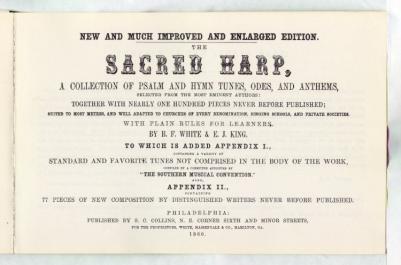 Sacred Harp singing, also known as shape-note singing, is an amateur and participatory tradition with a historical connection to congregational hymn singing. We sing for each other and not for an audience. There are no auditions and no commitment: anyone who’s interested is welcome to come and sing or listen. Anyone means anyone: we welcome you whether you are a singer or not, whether you are part of Yale or not, whether you have any experience of shape-note music or not.
Sacred Harp singing, also known as shape-note singing, is an amateur and participatory tradition with a historical connection to congregational hymn singing. We sing for each other and not for an audience. There are no auditions and no commitment: anyone who’s interested is welcome to come and sing or listen. Anyone means anyone: we welcome you whether you are a singer or not, whether you are part of Yale or not, whether you have any experience of shape-note music or not.
We call ourselves the Yale-New Haven Regular Singing after a music-literacy movement in 18th-century New England. Church music at that time had fallen into such decline that congregations in some churches knew just five or six tunes, and they sang them, in ragged unison, to whatever texts needed to be sung. There were no church choirs, members of the congregations couldn’t sing very well, and almost nobody knew how to read music. Some clergymen and lay leaders felt that the situation could be improved if more people had access to printed music in four-part harmony and knew how to read from it. They encouraged the establishment of “singing schools,” where members of the community learned to read music and to sing in harmony. The music-reading method taught in these singing schools was called singing by rule, singing by note, or Regular Singing. By creating a population of musically literate churchgoers, the Regular Singing movement prepared the way for the first flowering of indigenous American music: psalms, hymns, and anthems by composers like William Billings, Timothy Swan, and New Haven’s own Daniel Read. These tunes formed the foundation of the repertory embodied in shape-note tunebooks, and are still sung today by Sacred Harp singers around the world.
To find out more about Sacred Harp singing, visit fasola.org, Warren Steel’s comprehensive Sacred Harp Singing website, or the Wikipedia entries on Sacred Harp and shape-note music.
For other Sacred Harp singing opportunities in and around southern New England, visit the websites of the thriving shape-note communities located in Western Massachusetts, New York City, and Rhode Island.
For more information about us, contact Ian Quinn by email at ian.quinn@yale.edu. To receive weekly emails about upcoming singings, join our Google Group. We can also be found on Facebook.